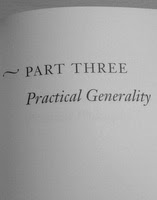
I’ve finally finished reading Thompson’s
Life and Action on a train down to London and thence to the University of Hertfordshire (coffee with Luciano and Dan) and back (just possible in a day with the new railway timetable). Since I seem to have been merely
summarising Life and Action (why?) I may as well finish. But I’ll come back in a day or so to try to correct the obvious errors in this and to say draw some sort of conclusions. (PS: I never did get time to do this.)
Here’s the thing that now strikes me. The introduction – which is oddly disarming – may be much more important than it first seemed. Perhaps the method – a mix of Aristotle and Frege – is much more important than the particular results / claims. So my cavalier ignoring of 6 pages on the logic of judgements about moral practices (see below) is very poor indeed. That, I suspect, is what the final section is really all about. But I just wanted to see the results. ((If I return, I may fill out the relevance of the story of Anaïs Nin writing plotless porn in my defence. Then again, perhaps not.))
We kick off with the idea that the essay will track two ideas: the early Rawls’ discussion of practices and David Gaulthier’s and Philippa Foot’s discussion of dispositions. Both express the same tendency to stress the role of something with a particular kind of generality. (At the end, practices get a better press than dispositions, I think.)
The particular focus of the essay is the moral obligation to keep promises, especially where, in a ‘tight corner’, keeping a promise has a moral disadvantage. There are cases where, had a subject not made a promise, then she/he would have different obligations. But in working out why having made a promise has the implications it does the idea that there are specific consequences of the individual act, considered in isolation, is to be played down.
On neither approach is the individual act of fidelity held to acquire the relevant characteristic, moral goodness or rationality, from the agent’s setting his sights on some benefit or excellence or merit that might reside in the individual action itself… [ibid: 153]
So, Thompson argues, Foot, Gaulthier and Rawls all realise that the perceived philosophical problem with the status of promising and its obligations arises from an over emphasis on individual acts.
[O]nce again the trouble is said to arise from the fixation of the philosopher’s attention on the individual action and the particular situation on which it bears. But in this instance [ie the case of Rawls’ practice rather than Gaulthier’s disposition] the trouble arises more precisely from a failure to recognise the so-called practice that the individual action is said to instance or embody. [156]
Now one way that an appeal to the implicit generality of a practice or rational disposition might help things is if there’s a further argument for the general practice or rational disposition. That is:
that individual acts of infidelity might lead to the loss of a profitable disposition or the weakening of a beneficial practice, whilst acts of fidelity help preserve these practices. [157]
But that is not the nature of the appeal to generality that interests Thompson (and he does not think it there in authors he considers).
Thompson then sells us two characteristic ‘marks’ of practices and/or dispositions. They are both general and actual. Generality is cashed out in its specific way between pp158-160. Crucially, it is neither the generality of a longer term intention (see essay 2) because that ‘wind[s] down under its own steam, to pass away with its execution or completion’. The actuality marks a contrast with deontological generality: ‘a norm inscribed in the nature of things, the truth of a general ‘principle’ of morality or rationality that forbids infidelity’ [160].
The next six pages [pp161-166] describe the logical form of the generality in play. Shockingly, I’m just going to omit that. It may be the most important part of the essay. Go read it!
Chapter 10 begins with the idea that the authors hold a specific kind of two tier theory of rationality. They have a transfer or transparency principle and a standard of appraisal. A practice makes actions good; a disposition makes actions rational. (The standard of appraisal is the utility or the rational ends of the practice or the rational disposition.) Other authors deploy a variety of other forms of generality and thus there will be a variety of kinds of relation between the generality and particular actions and a variety of kinds of property transmitted downwards: goodness, rightness, fairness etc.
There is then a further question of what the justification for the generality itself is (Rawls, eg, moves from utilitarian to a contractualist justification of his generality). But Thompson says he will put that questions aside. [p169].
Now a central feature of the kind of transparency principle concerned is that it is neither substantial nor action guiding. Thus is differs from, eg, forms of rule utilitarianism which claim that the goodness of an act derives from a rule so construed because for that contrasting position, the transfer principle is a substantial part of the moral theory itself to be justified along with the rest of the theoretical apparatus. (There’s a nice consideration [174] of how one might misconstrue the insubstantial view of a transparency principle and act in accord with the generality but still fail to be acting rightly.)
To get a contrasting case, Thompson describes Rawls' invocation of an analogy with the relation between actions allowed in a baseball game (I think that’s the game discussed here: much talk of taking a walk). Here there is a suitable priority of general game over individual action in so far as the action constitutively depends on the rules of the game and, indeed, on conceptual judgements. So eg. the game of promising also includes conceptual judgements that someone is promising. But, because the notion of practice so characterised includes mere games, then it isn’t enough to transmit goodness to acts of fidelity.
The chapter ends with an attempt to add some flesh to the notion of practice relevant to this moral philosophical context. Thompson outlines Rawls view that because a trivial promise can be trumped by circumstances, this allowance is written into out practice of promising. To make this case he contrasts our practice with two others: one where promises have to be kept come what may; and one in which promises made whilst asleep also count. Since these are alternative practices to ours, ours has to be distinguished from them. Thompson, however, disagrees. One consequence of Rawls’ account is that because the alternatives are clearly defective as a whole, they cannot transmit a normative standard even to the central cases where they agree with ours. But he also argues that we couldn’t easily identify these as genuine alternatives. If one or more individuals were to misapply our promising practice in the same ways, we would conclude that it was a misunderstanding, not an alternative. The same applies to the aliens. Their ways of going on are not distinct promising practices but mere misapplications of ours (in the same way that a culture who call fool’s gold ‘gold’ has misunderstood the proper extension of the substance concept ‘gold’).
It might further be objected that the account I am imaging must be circular: we want to say that individual acts of fidelity are morally good “because the practice is”, but then, apparently, let the goodness or badness of an individual action determine whether or not it falls under the practice. But we need not accept the second clause. We need only say that if the practice makes some action good, then any action the practice cannot make good does not express the practice. [188]
The final chapter considers and rejects an attempt by Rawls to specify the nature of agreement in practice in a bottom up manner. Such approaches leave a gap between the contemplative knowledge that, eg, other people are bound thus and so and one’s own choosing to act.
Though we may grant that this pile up of conditions attaches a perfectly legitimate sense to the word practice, we must reject it as beside the point. Any theory that represents the existence of the practice as a circumstance and condition of the agent’s acting in accordance with it – as a datum to which she responds – must, we said, appeal to something else as the principle that directly governs the agent’s compliant individual action. [196]
Thompson argues instead that the concept of practice has to involve a kind of self-reference.
[T]he exercise of such practice dependent concepts and the employment of such practice-dependent forms of account are themselves among the phenomena of the practice. [198]
This then allows a comparison back to the notion of life-form from the first essay. Three conditions on practices set on p199 are found also in the notion of life form. Practice is a ‘determinate form of a more abstract category, a genus that takes a different shape in the category of life-form’ [200]. Both forms include generality and actually and an implicit standard of appraisal or normality. Like practices, life-forms are implicit objects of thought in much of what we say [201]. In applying characteristics of life such as breeding and feeding we apply an interpretative structure to phenomena. Crucially, though – and like practices – it is not merely externally related to the individual bearer.
Thompson goes on to suggest ways in which expectations proper to life are built into the kind of generality of judgements made. Thus whilst saying that water is a liquid might be explained as resulting from the imposition of typical observer conditions, saying that milk is a liquid has a different kind of status, resulting from the Aristotelian categoricals discussed in essay one. Particular facts have to be brought into play only where things have gone wrong, development has failed to be normal and healthy, for example. But:
none of this is a mater of the complication of the ‘pragmatics of explanation’ by our ‘expectations’. The circumstances that go unmet where the ‘normal’ development fails are not a subjective imposition on the subject matter. They are expressed in the type of judgement that is essential to the representation of this kind of kind to begin with. If we must speak of expectations, they are those of the life-form itself. [207]
Talk of eating and breeding is made against a background of thinking of life-forms. So talk of fidelity, to return to the practice of promise keeping, is made against a background that presupposes a practice of promise keeping. That background practice is basic and not a matter to be built up from an account of individual dispositions. (And thus now practice and disposition come apart at least when the latter is misunderstood.)
We might think of fidelity as a private attainment in a sense, as something that might distinguish one of the practice bearers from another, but as such it is merely the negation of infidelity or the absence of those impediments. Thus, so considered, it is precisely not itself a source, account or ground of action. Considered as a source of action, fidelity is the practice under another name and the same for everyone. Where agents keep promises from fidelity, their actions have different sources only in the sense that they have made different promises. [210]
 Sadly I’ve not been able to return to Michael Thompson’s book and its slot has been taken by other things that now need to be read more urgently for specific purposes. So the witty and insightful criticism I aspire to will just have to wait. (A sign of my pessimism on that score is that I’ve shipped the book back to my university office.)
Sadly I’ve not been able to return to Michael Thompson’s book and its slot has been taken by other things that now need to be read more urgently for specific purposes. So the witty and insightful criticism I aspire to will just have to wait. (A sign of my pessimism on that score is that I’ve shipped the book back to my university office.)


 Waiting in the Preston station buffet post teaching, part way through a ten day period when I
Waiting in the Preston station buffet post teaching, part way through a ten day period when I 